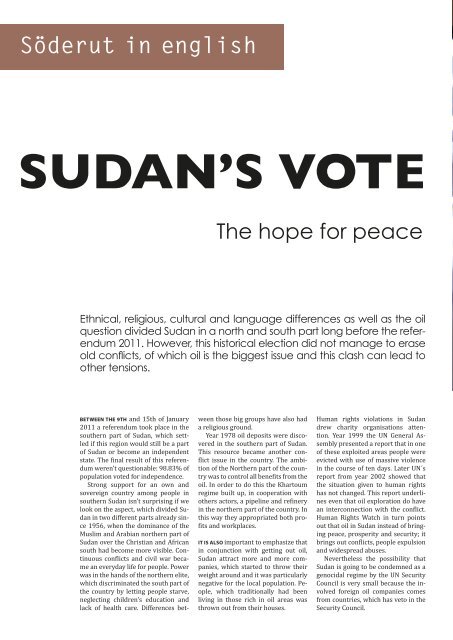här! - Utrikespolitiska Föreningen Södertörn
här! - Utrikespolitiska Föreningen Södertörn
här! - Utrikespolitiska Föreningen Södertörn
You also want an ePaper? Increase the reach of your titles
YUMPU automatically turns print PDFs into web optimized ePapers that Google loves.
Söderut in english<br />
SUDAN’S VOTE<br />
BETWEEN THE 9TH and 15th of January<br />
2011 a referendum took place in the<br />
southern part of Sudan, which settled<br />
if this region would still be a part<br />
of Sudan or become an independent<br />
state. The final result of this referendum<br />
weren’t questionable: 98.83% of<br />
population voted for independence.<br />
Strong support for an own and<br />
sovereign country among people in<br />
southern Sudan isn’t surprising if we<br />
look on the aspect, which divided Sudan<br />
in two different parts already since<br />
1956, when the dominance of the<br />
Muslim and Arabian northern part of<br />
Sudan over the Christian and African<br />
south had become more visible. Continuous<br />
conflicts and civil war became<br />
an everyday life for people. Power<br />
was in the hands of the northern elite,<br />
which discriminated the south part of<br />
the country by letting people starve,<br />
neglecting children’s education and<br />
lack of health care. Differences bet-<br />
The hope for peace<br />
Ethnical, religious, cultural and language differences as well as the oil<br />
question divided Sudan in a north and south part long before the referendum<br />
2011. However, this historical election did not manage to erase<br />
old conflicts, of which oil is the biggest issue and this clash can lead to<br />
other tensions.<br />
ween those big groups have also had<br />
a religious ground.<br />
Year 1978 oil deposits were discovered<br />
in the southern part of Sudan.<br />
This resource became another conflict<br />
issue in the country. The ambition<br />
of the Northern part of the country<br />
was to control all benefits from the<br />
oil. In order to do this the Khartoum<br />
regime built up, in cooperation with<br />
others actors, a pipeline and refinery<br />
in the northern part of the country. In<br />
this way they appropriated both profits<br />
and workplaces.<br />
IT IS ALSO important to emphasize that<br />
in conjunction with getting out oil,<br />
Sudan attract more and more companies,<br />
which started to throw their<br />
weight around and it was particularly<br />
negative for the local population. People,<br />
which traditionally had been<br />
living in those rich in oil areas was<br />
thrown out from their houses.<br />
Human rights violations in Sudan<br />
drew charity organisations attention.<br />
Year 1999 the UN General Assembly<br />
presented a report that in one<br />
of these exploited areas people were<br />
evicted with use of massive violence<br />
in the course of ten days. Later UN´s<br />
report from year 2002 showed that<br />
the situation given to human rights<br />
has not changed. This report underlines<br />
even that oil exploration do have<br />
an interconnection with the conflict.<br />
Human Rights Watch in turn points<br />
out that oil in Sudan instead of bringing<br />
peace, prosperity and security; it<br />
brings out conflicts, people expulsion<br />
and widespread abuses.<br />
Nevertheless the possibility that<br />
Sudan is going to be condemned as a<br />
genocidal regime by the UN Security<br />
Council is very small because the involved<br />
foreign oil companies comes<br />
from countries, which has veto in the<br />
Security Council.


